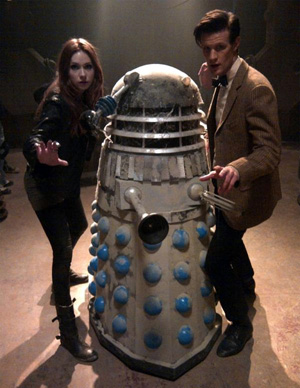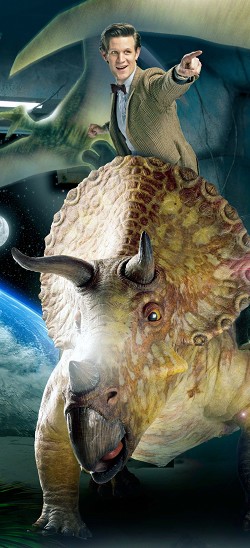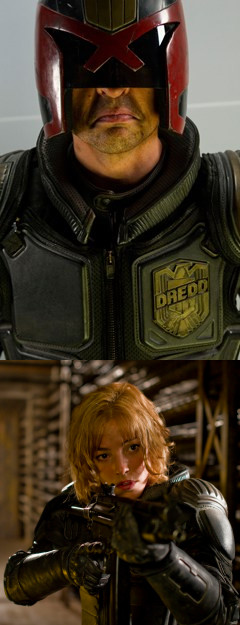 Given we won’t be recording our podcast review of Asylum of the Daleks for several more days yet (after the next episode of Doctor Who airs, in fact), I think I should put down a few random thoughts now, before that next episodes goes out.
Given we won’t be recording our podcast review of Asylum of the Daleks for several more days yet (after the next episode of Doctor Who airs, in fact), I think I should put down a few random thoughts now, before that next episodes goes out.
The first and most obvious one – was that the new companion appearing much earlier than expected? At first I thought ‘that can’t be her, just someone that looks like her, surely?’ It quickly became clear it was at least Jenna-Louise Coleman but was it this ‘Clara’ character? The jury’s still out on that one but if it is her, then how? I can’t believe Moffat will pull another River Song, seeing her death before the Doctor properly meets her, if for no other reason than that was a rubbish way to die (assuming she did!) Modern day companions (and indeed Doctors) should die heroically, saving other characters we care about. Maybe technically Oswin did but it didn’t really feel that way. Also, why didn’t she remember the Doctor? The horrific Dalek conversion? Maybe but a little too neat, I’d have expected some trace memory at the end, if only to intrigue the Doctor and entice the majority of the viewers who won’t have known who she was.
Talking of Dalek conversions, I think we’ve only ever seen Davros do this in the past and it doesn’t seem to fit into the racial purity of the Daleks themselves, let alone the ‘new paradigm’ lot. Of course perhaps Oswin was from an earlier non-pure era (perhaps even from Necros). On the subject of that earlier era, it is interesting that so many of the Doctor’s past battles with the Daleks were referenced, did the Time War have so little effect (besides upgrading most of the survivors casings?!)
The Dalek Supreme is now calling itself Prime Minister, eh? Complete with a Parliament, no less? I can’t imagine left wing Dalek political parties do too well in the Dalek elections! I suppose Moffat is trying to suggest a new start for the Daleks, a continuation of that theme from Victory of the Daleks. Now they don’t even remember the Doctor. Isn’t is convenient that their minds are all now linked?! I could buy that all of their onboard computers are linked and, as is slowly happening to humanity, they rely on their computers to remember nearly everything for them but actively wiping their short term memory, too? They really must be cyborgs now.
Then there’s the Ponds (or Williamses, technically!) I hadn’t watched the ‘Pond Life’ prequel shorts, for fear of spoilers, so it was a total surprise when it was revealed that they were divorcing.  It was rather less of a surprise that Amy was instigating it, for yes, we have long been shown that Rory cares for her more than she does him. She has her moments, when she is reminded of him in some extraordinarily positive light (such as his waiting nearly 2000 years for her or just plain dying again) but, of the two, only one has never, could never, wander (holographic siren doctors aside!)
Compressed story telling, so we were warned to expect. Â The cleverest man in the room fixes Amy and Rory’s relationship with a some slight of hand, both physical and psychological. Was that all of 30 seconds screen time, including the straightening of his bow tie? It may have been compressed but it was nonetheless strong stuff and was so neatly spelled out that they didn’t need an hour to build up to it or ten minutes to resolve it. Â It really is a testament to Gillan and Darvill’s acting and Moffat’s character building for the past two years. Â This isn’t your old school Doctor Who, this is proper drama and really quite brave stuff for a programme that is aimed at family viewing. Â Plot-wise it does raise the question of will the Doctor help them in their baby making dreams? A quick visit to some future super-advanced medical facility should be able to quickly fix whatever problems Demons Run inflicted on Amy, I would think. Â Is that the ‘heartbreaking’ end Moffat has in store for the Ponds, them living happily ever after with a new baby? Probably not as that’s probably more ‘heartwarming’ but this is Moffat, so don’t forget Rule Number One!
Should we expect more medical drama in the form of the Dalek nanogenes still affected Amy? I suspect not. Â It wasn’t explicitly stated but I get the feeling they were brought back under control and then eradicated by the bracelet. If not then the lack of threat after Amy and Rory’s reconciliation, not to mention the Doctor casually dropping them off home, would seem to be sloppy writing at best (possibly hand waved away by saying the Doctor doesn’t realise the threat but in that case it should still be raised again for the audience, in a ‘you know something the Doctor doesn’t’ sort of way). Â If Amy starts behaving mechanically and eating nothing but Smarties then maybe she’s in trouble!
On the subject of these new ‘robomen’, the partially converted Dalek servants, let me go all stand-up and say, what was that all about?! They have the Moffat trademark of potentially being popular in the school playground – kids could pretend an eyestalk is popping out of their head and gun out of their hand.  The dead ones were particularly nightmare-fuelling.  The idea of trespassers being integrated into the defence systems was good, too.  Still, didn’t it seem just a little silly to anyone else?  Why have a Dalek eye-stalk come out of someone’s head?  True, the long dead crew’s eyes probably weren’t working so well after all that smelly rotting but their bodies could have (should have?) been converted before bits started falling off them – alive or dead, it’s all the same to the nanogenes, so why should the dead ones be any more decayed than the apparent survivor?  Picky, I know, but it’s a shame that ‘every Dalek, ever’ got such short shrift when they could have taken the screen time of these illogical zombies.
I am beginning to sound a little negative but, on the whole, I don’t feel that way about the episode. True, it wasn’t an instant favourite such as the likes of The Eleventh Hour or The Big Bang were for me.  It was a runaround of an adventure that, besides a bit of much needed Dalek reworking, felt a little throwaway. Clearly ‘Oswin Oswald’ is leading somewhere (‘Oswald’, really? Coming up to the 50th Anniversary of Doctor Who and JFK’s bullet catching? A bit on the nose, perhaps?) Also the reiteration of ‘Doctor Who?’ (two stories in a row now, ignoring the 2011 Christmas Special) is clearly leading to something.  Presumably the fields of Trenzalore and all that but I don’t believe (and certainly hope) that Moffat really intends to name the Doctor.  What would be the point? He has a functional name that we know him by and short of revealing him to be god, the devil or some Doctor Who specific mythical figure, I can’t see there’s anything to be gained by giving him yet another moniker (John Smith, Theta Sigma, The Other…)
Anyway, I’m getting off topic.  I’d award Asylum of the Daleks a B-, good corridor running fun with the added pleasure in seeing the hated ‘new paradigm’ Daleks melting into the background, hopefully soon to disappear completely (though the red Dalek, one time referred to as the ‘drone’, does look rather better with the darker red metallic paint job, though).  With luck we’ll never have the chance to be told what an Eternal Dalek does!
All in all, a good, energetic start to the new season, clearly intended to win over those casual viewers but keep the interest for us old fans. Now only four more to go until bye, bye Pond and then Christmas…










 Let’s cut straight to the chase here, I didn’t enjoy Dinosaurs on a Spaceship.
Let’s cut straight to the chase here, I didn’t enjoy Dinosaurs on a Spaceship. After what seems like an age since the original announcement, finally the new Judge Dredd film, named simply ‘
After what seems like an age since the original announcement, finally the new Judge Dredd film, named simply ‘

Recent Comments